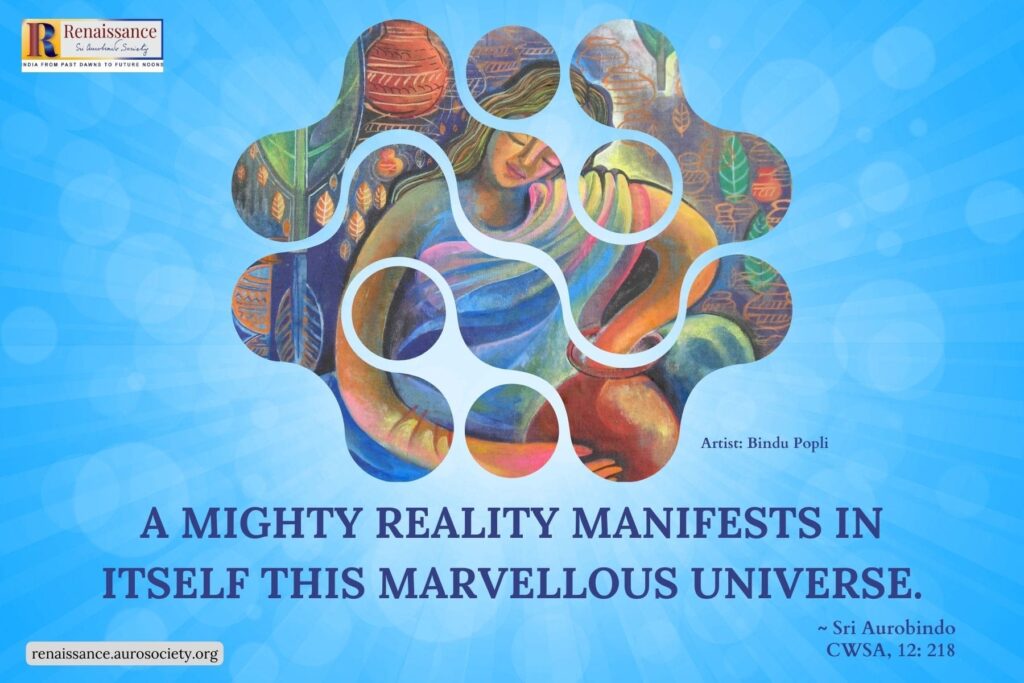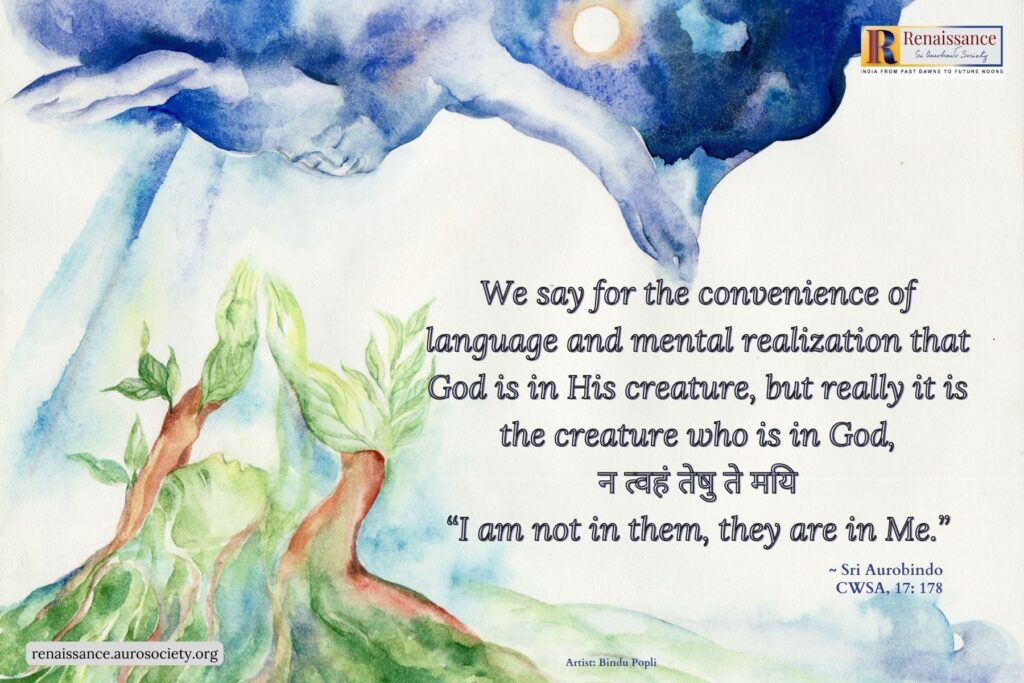Editor’s Note: In these selected passages, Sri Aurobindo elucidates that one of the aims in Integral Yoga is to purify and transform the usual egoistic human love into a purer love towards the Divine at all levels of the being. He also explains that after one enters the spiritual life, the relationship with the Divine takes precedence over the ordinary social relations. Either the family relations naturally fall off or become the ground for karmayoga based on the soul’s need.
🌸🌸🌸
Consciousness at the Basis of Human Relations
Absence of love and fellow-feeling is not necessary for nearness to the Divine; on the contrary, a sense of closeness and oneness with others is a part of the divine consciousness into which the sadhak enters by nearness to the Divine and the feeling of oneness with the Divine.
An entire rejection of all relations is indeed the final aim of the Mayavadin, and in the ascetic Yoga an entire loss of all relations of friendship and affection and attachment to the world and its living beings would be regarded as a promising sign of advance towards liberation, Moksha; but even there, I think, a feeling of oneness and unattached spiritual sympathy for all is at least a penultimate stage, like the compassion of the Buddhist, before the turning to Moksha or Nirvana.
In this Yoga the feeling of unity with others, love, universal joy and Ananda are an essential part of the liberation and perfection which are the aim of the sadhana.
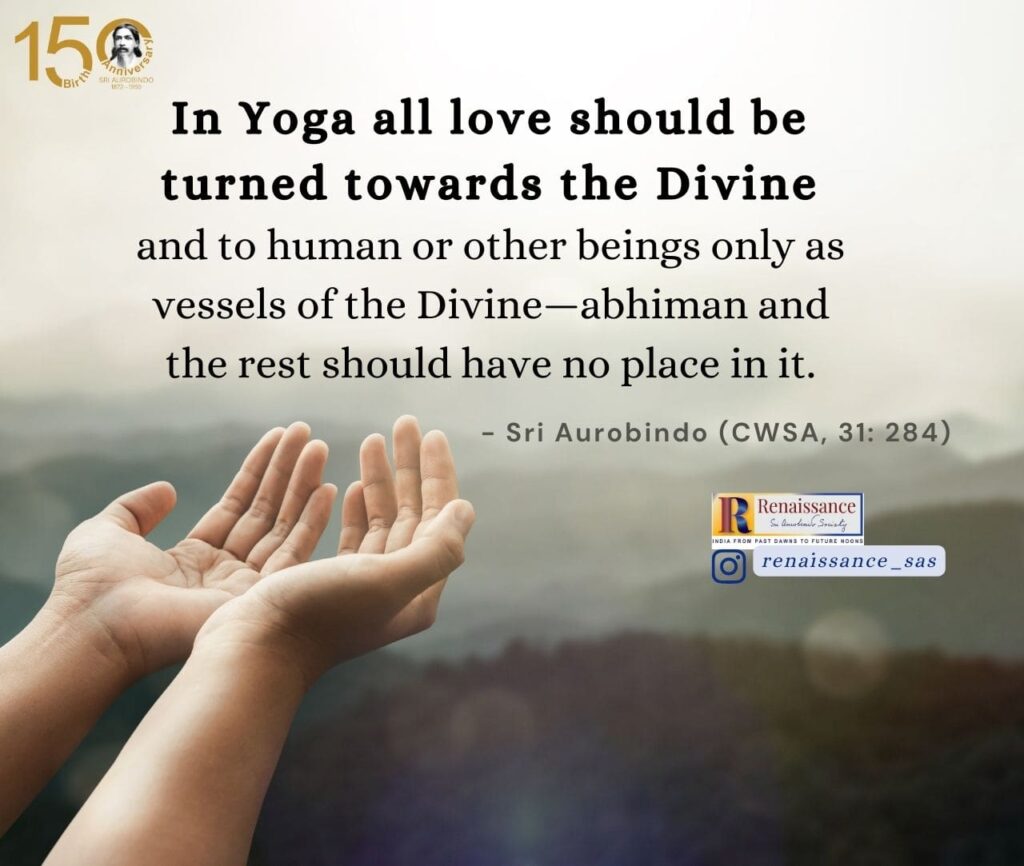
On the other hand, human society, human friendship, love, affection, fellow-feeling are mostly and usually—not entirely or in all cases—founded on a vital basis and are ego-held at their centre.
It is because of the pleasure of being loved, the pleasure of enlarging the ego by contact, mutual penetration of spirit, with another, the exhilaration of the vital interchange which feeds their personality that men usually love—and there are also other and still more selfish motives that mix with this essential movement.
There are of course higher spiritual, psychic, mental, vital elements that come in or can come in; but the whole thing is very mixed, even at its best. This is the reason why at a certain stage with or without apparent reason the world and life and human society and relations and philanthropy (which is as ego-ridden as the rest) begin to pall.
There is sometimes an ostensible reason—a disappointment of the surface vital, the withdrawal of affection by others, the perception that those loved or men generally are not what one thought them to be and a host of other causes; but often the cause is a secret disappointment of some part of the inner being, not translated or not well translated into the mind, because it expected from these things something which they cannot give.
It is the case with many who turn or are pushed to the spiritual life. For some it takes the form of a vairāgya which drives them towards ascetic indifference and gives the urge towards Moksha.
For us, what we hold to be necessary is that the mixture should disappear and that the consciousness should be established on a purer level (not only spiritual and psychic but a purer and higher mental, vital, physical consciousness) in which there is not this mixture.
There one would feel the true Ananda of oneness and love and sympathy and fellowship, spiritual and self-existent in its basis but expressing itself through the other parts of the nature.
If that is to happen, there must obviously be a change; the old form of these movements must drop off and leave room for a new and higher self to disclose its own way of expression and realisation of itself and of the Divine through these things—that is the inner truth of the matter.
Relations that Interfere with Spiritual Progress
Relations which are part of the ordinary vital nature in human life are of no value in the spiritual life—they rather interfere with the progress; for the mind and vital also should be wholly turned towards the Divine.
Moreover, the purpose of sadhana is to enter into a spiritual consciousness and base everything on a new spiritual basis which can only be done when one has entered into complete unity with the Divine. Meanwhile one has to have a calm goodwill for all, but relations of a vital kind do not help—for they keep the consciousness down on a vital basis and prevent its rising to a higher level.
* * *
The love which human beings feel for one another is also usually an egoistic vital love and these other movements, claim, demand, jealousy, abhiman, anger etc., are its common accompaniments. There is no place for them in Yoga—nor in true love, psychic or divine.
In Yoga all love should be turned towards the Divine and to human or other beings only as vessels of the Divine—abhiman and the rest should have no place in it.
From our archives:
Gṛhasthadharma: The Dharma of a Householder
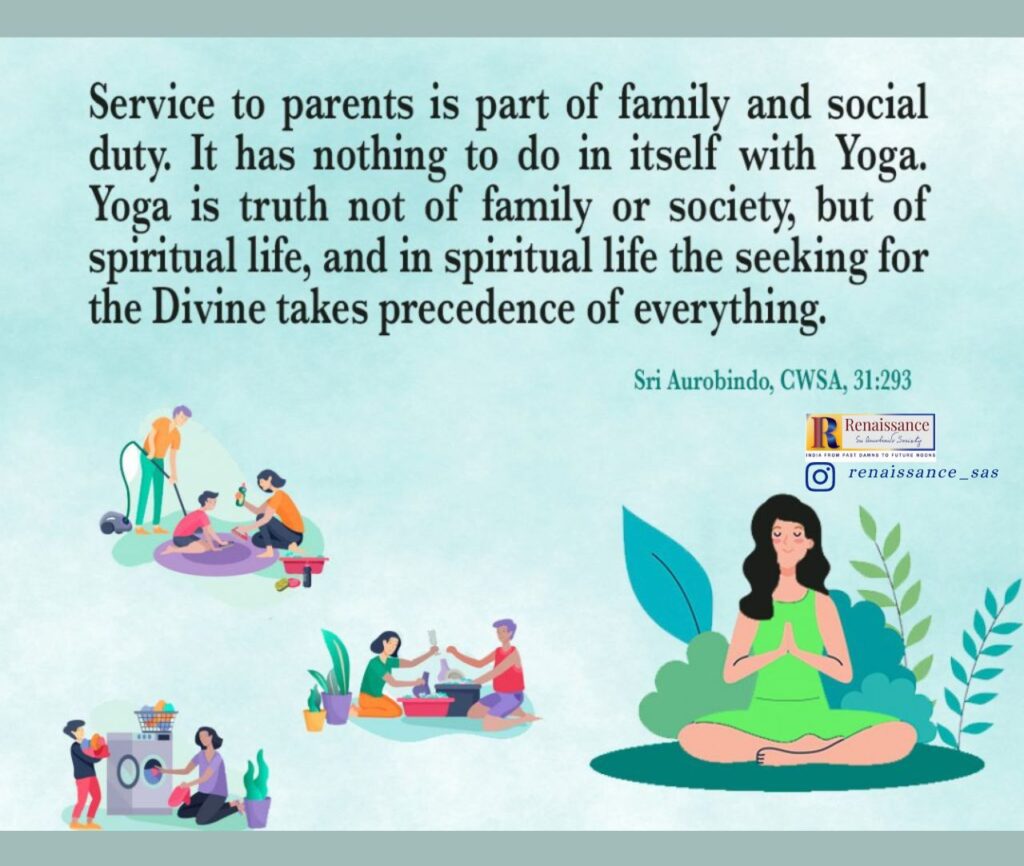
Family Duties and Yoga
. . . Relations after taking up Yoga should be less and less based on a physical origin or the habits of the physical consciousness and more and more on the basis of sadhana—of sadhak with sadhaks, of others as souls travelling the same path or children of the Mother than in the ordinary way or with the old viewpoint.
* * *
When one enters the spiritual life, the family ties which belong to the ordinary nature fall away—one becomes indifferent to the old things. This indifference is a release. There need be no harshness in it at all. To remain tied to the old physical affections would mean to remain tied to the ordinary nature and that would prevent the spiritual progress.
* * *
Human physical relations are necessarily temporary—the soul has to go away and prepare itself for other lives through which it will move eventually nearer to the Divine.
Regard it so and open yourself to the peace from above; turn yourself towards that which is Eternal and Divine.
* * *
. . . If you want to practise Yoga, you must be able to live in the world, so long as you are there, with a mind set upon the Divine and not bound by the environment. One who does this, can help those around him a hundred times more than one who is bound and attached to the world.
* * *
The question about the family duties can be answered in this way—the family duties exist so long as one is in the ordinary consciousness of the grahasthan; if the call to a spiritual life comes, whether one keeps to them or not depends partly upon the way of Yoga one follows, partly on one’s own spiritual necessity.
There are many who pursue inwardly the spiritual life and keep the family duties, not as social duties but as a field for the practice of karmayoga, others abandon everything to follow the spiritual call or line and they are justified if that is necessary for the Yoga they practise or if that is the imperative demand of the soul within them.
* * *
There is no harm in devoting yourself to occupations which will help the sadhana. The earning of money and family affairs have only to be looked after if the circumstances are such as to compel it. They should then be done in a spirit of entire detachment, dealing with them so as to develop in oneself the consciousness described in the Gita.
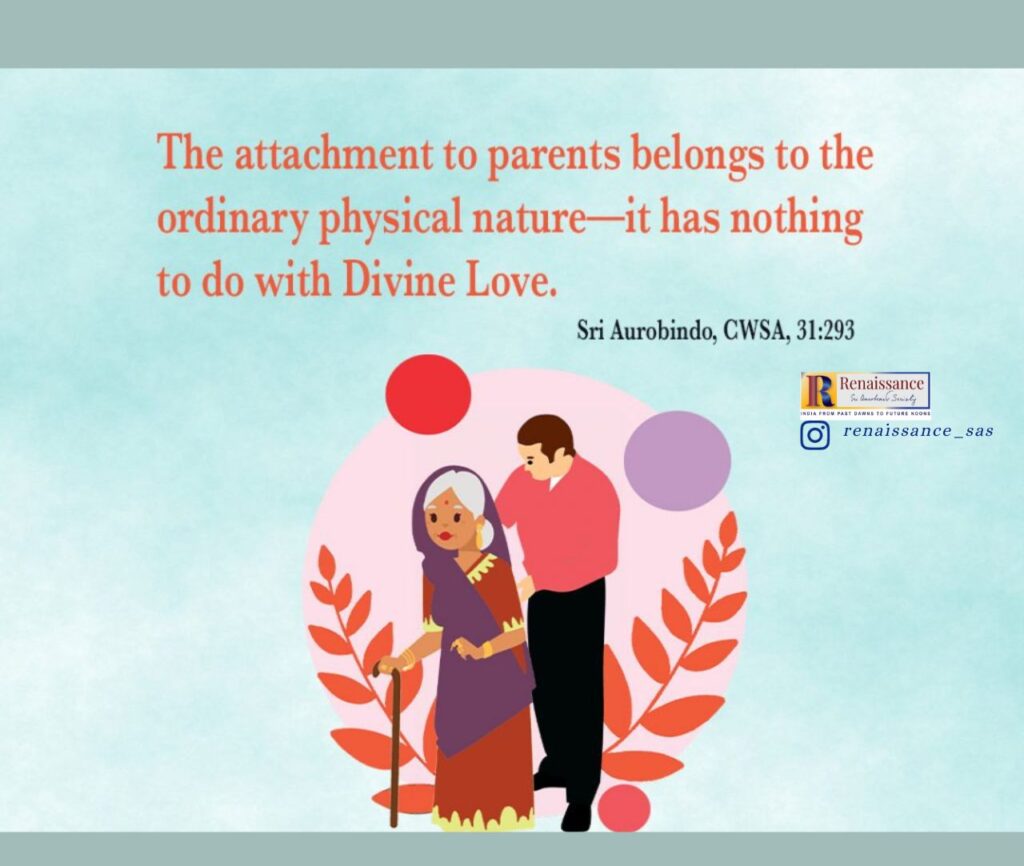
Relations between Parents and Children
There are many kinds of truth and in the Shastra you will find all kinds, some seeming in conflict with others. Service to parents is part of family and social duty. It has nothing to do in itself with Yoga.
Yoga is truth not of family or society, but of spiritual life, and in spiritual life the seeking for the Divine takes precedence of everything.
If we ask you to remain still with your father and mother, it is not from the point of view of Truth, but of charity. Four of their children have already left them to come to the Asram; it would be too hard a blow if you also left them now. As you have remained with them so long, you might remain a little longer.
Even while in the family, you can prepare yourself for the spiritual life, by remembering the Divine in all you do and by doing it as a sacrifice for the sake of the Divine.
* * *
It [a child’s debt to his parents] is a law of human society, not a law of Karma.
The child did not ask the father to bring him into the world—and if the father has done it for his own pleasure, it is the least he can do to bring up the child.
All these are social relations (and it is not at all a one-sided debt of the child to the father, either), but whatever they are, they cease once one takes to the spiritual life. For the spiritual life does not at all rest on the external physical relations; it is the Divine alone with whom one has then to do.
* * *
The attachment to parents belongs to the ordinary physical nature—it has nothing to do with Divine Love.
The inner being turned to the Divine naturally draws away from old vital relations and outer movements and contacts till it can bring a new consciousness into the external being.
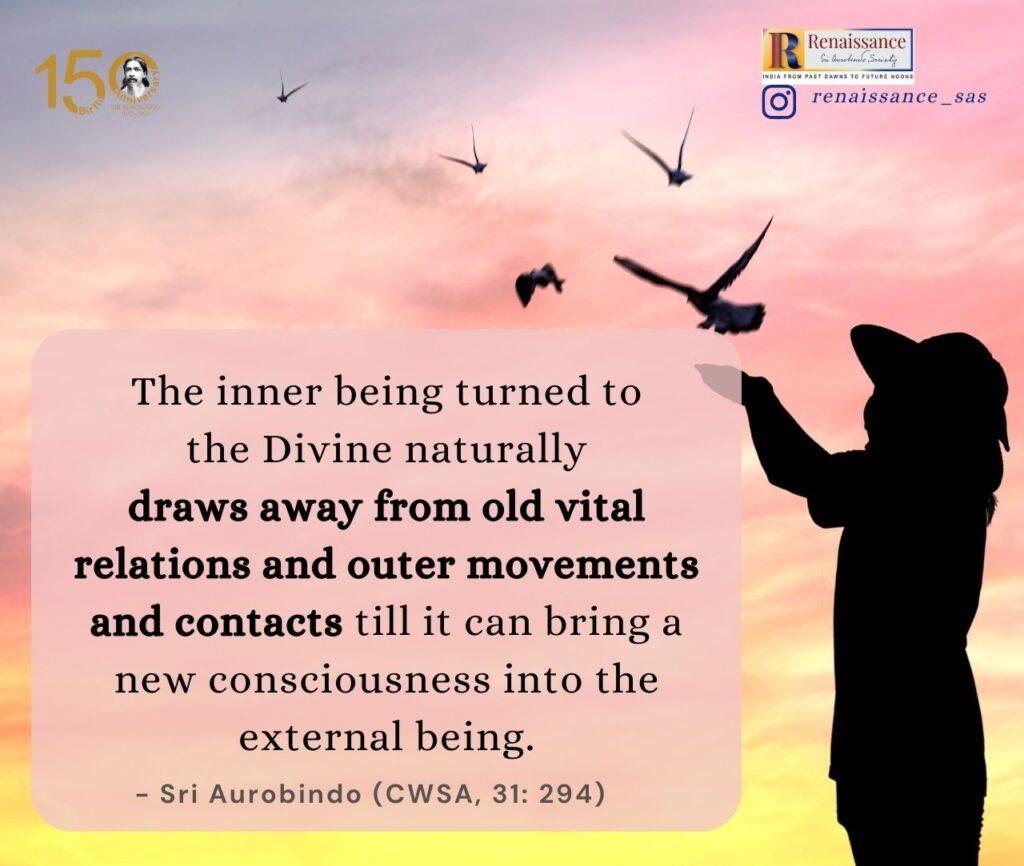
Read:
Friendship and Affection in the Path of Sadhana
🌸🌸🌸🌸🌸
~ Design: Ramajayam R. & Raamkumar

